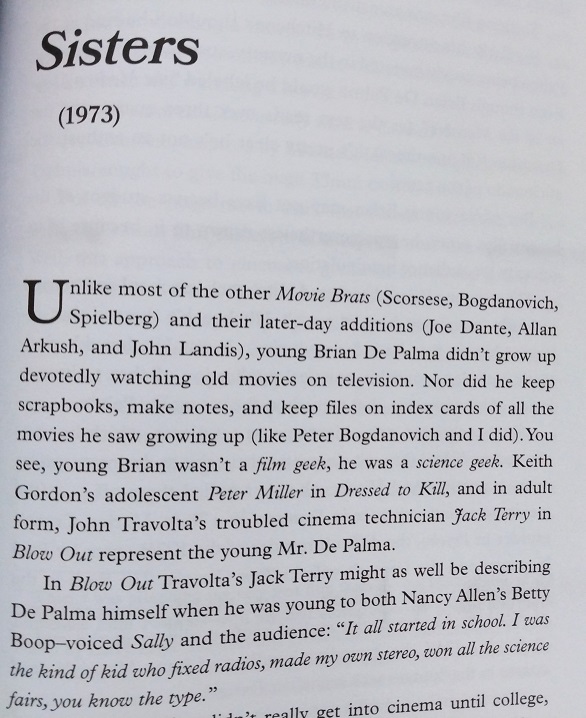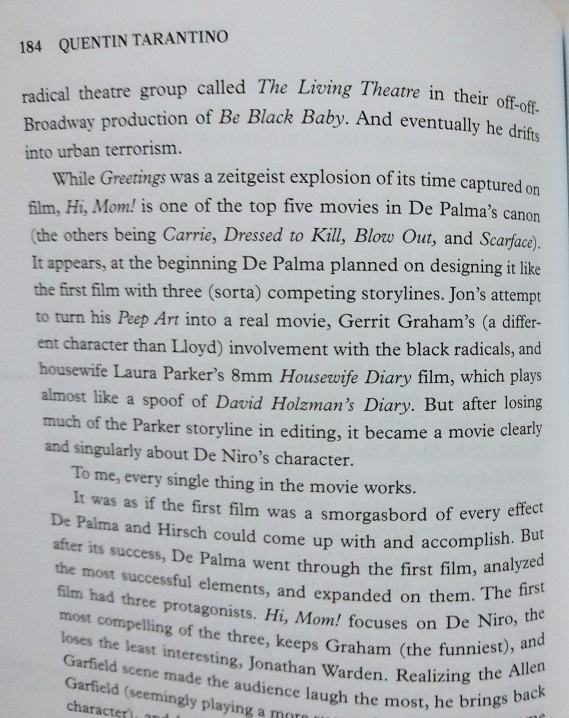INCLUDES MUCH ABOUT DE PALMA, SCHRADER, WITH CHAPTERS ABOUT SISTERS, TAXI DRIVER, AND MORE

It was such a pleasure to listen to Quentin Tarantino and friends talk about Brian De Palma's Dressed To Kill on a recent episode of Video Archives. Now, only a few weeks later, we have Tarantino's first book of film criticism, Cinema Speculation, which delves into much of De Palma's early work. Covering Tarantino's formative years of watching films and thinking about what makes them tick, the author includes De Palma and Francis Ford Coppola as filmmakers who were "strong but less prolific" members of the "Post-Sixties Anti-Establishment Auteurs," before moving on to a chapter about the "Movie Brats." The chapter on Sisters moves from De Palma's early features and into what it was about Hitchcock that specifically drew De Palma's interest. There's an entire chapter speculating on "What If Brian De Palma Directed Taxi Driver instead of Martin Scorsese?"
Here's some of what is being written about the book the past week:
Glenn Kenny, Some Came Running
I found myself agreeing with him a lot — about John Flynn’s The Outfit, which he’s completely right about (“except for the freeze-frame at the end,” I thought to myself, and then I watched the ending again and thought, “Nah, he’s right about that too”), about Dirty Harry, you know, that sorta thing. He’s really weird about Boorman’s Point Blank, and I don’t think he makes his case against it, as I don’t think he makes his case for Deliverance going “slack.” But I decline to speculate about just why he feels like dumping on Boorman so much. I mentioned his bluster before — I was startled at times about how blunt and brash he can be. He’s not at all afraid of potentially ticking off filmmakers one infers that he’s been friendly with in the past. “De Palma would fall on his face and never really get back up again after fucking up Tom Wolfe” is a weird thing to say, given De Palma then went on to make Raising Cain, Carlito’s Way, Snake Eyes, Femme Fatale (maybe the ultimate De Palma film in my opinion) and Mission Impossible.
Richard Brody, The New Yorker
The book’s title is more than rhetoric. The best sections involve Tarantino’s counterfactual speculations, based on his copious reading of books and articles about Hollywood, his familiarity with early versions of scripts, his acquaintance with Hollywood notables, and his critical insights regarding the careers and passions and inclinations of these notables. In the long chapter on “The Getaway,” there’s a great riff on Peter Bogdanovich being attached to the project before Sam Peckinpah was signed to direct it, an extended discussion of how Ali MacGraw came to co-star in it with McQueen and the effect that her performance and her persona had on its reception; a careful look at how the casting of supporting roles determines the movie’s tone as well as its effect on viewers; and a detailed study of the differences between the film and the novel, by Jim Thompson, on which it’s based. The book’s intellectual engine is its auteurist perspective. As a director as well as a virtual critic, Tarantino delves deep into the kinds of decisions that directors make, both at the macro level of major career moves and the micro level of behavioral details and camera angles, with an absorbing acuity.The extended portraiture of Brian De Palma stands out for the idiosyncrasy of its insights, which spill over into a detailed study of “Taxi Driver,” which De Palma was originally supposed to direct. Tarantino muses on what kind of movie would have resulted, and how De Palma’s entire career may have shifted as a result. (It wouldn’t be Tarantino if the discussion of “Taxi Driver” didn’t pivot on race—he’s obsessed with the fact that the movie’s pimp, played by Harvey Keitel, is white, and he assumes, for reasons that he details at length, that, had De Palma directed it, the pimp would have been Black.
Los Angeles Times interview with Quentin Tarantino, by Glenn Whipp
Tarantino has been thinking about writing “Cinema Speculation” for years, The book evolved, he says, from being a mere appreciation of his favorites to a survey of films that inspired a “point of view worth talking about.”“Doing this made me respect the professionals of film criticism even more for the simple fact that I realized I couldn’t do what they do,” Tarantino says. “If my job was to go and watch the new movies every week and then write what I thought, I can’t imagine I would have anything to say about everything, other than offer a plot summary and a ‘good,’ ‘bad,’ ‘indifferent’ verdict. With the book, I wanted to find something quirky that’s interesting and worth talking about.”
And so the chapter on “Taxi Driver” emphasizes the groundwork laid for it by Charles Bronson’s “Death Wish.” (Tarantino also recalls seeing the movie with a raucous audience at the Carson Twin, hardly the kinds of cineastes who revere it today.) Filmmakers De Palma, Don Siegel and Schrader become characters of a sort, moving through the book and Tarantino’s young life. In fact, there was so much Schrader at one point that Tarantino decided to remove a chapter devoted to his 1974 Japanese gangster homage “The Yakuza.”
“If I kept that, I would have needed Paul to write a foreword to the book,” Tarantino says, laughing.
Asked why he landed on Schrader, known for films centered on tormented men and their righteous fury, Tarantino paused for a moment.
“I don’t want to be the one to break down his theme in a sentence, but inarticulately, lonely men with nothing but a profession existing in four walls,” Tarantino says. “And sometimes those four walls are their apartment, sometimes they’re a city, sometimes they’re the f— planet Earth. Sometimes it’s just other human beings and how they bump up against the four walls until, usually, there’s blood all over them.”




